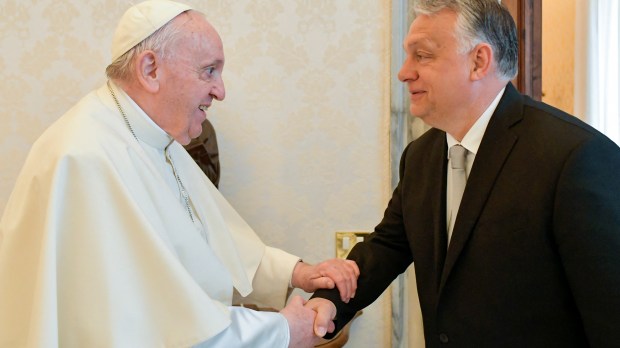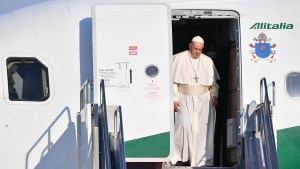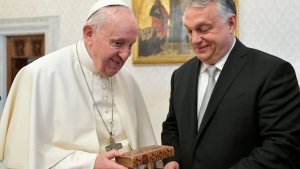Hungarian Prime Minister Viktor Orbán, in power since 2010, is often presented as the embodiment of a “populist” and anti-migrant political right, constituting the antithesis of the positions of Pope Francis. Although they have shaken hands on several occasions, including during an audience with European Union heads of state and government in 2017, relations between the Argentine Pope and the Hungarian prime minister have long been presented as cold.
Pope Francis went to Budapest on September 12, 2021, for the closing of the International Eucharistic Congress — a short “stopover” of a few hours on the way to Slovakia. At that time he minimized the scope of his meeting with the head of government, whom he met together with the then-President of the Republic, János Áder. On the plane returning from his tour of central Europe, however, the Pope praised the Hungarian government’s policies in favor of families and the fight against “demographic winter.”
The situation of Ukrainian refugees and Hungarians in Ukraine
The second visit of Pope Francis to Budapest takes place in a different context. This time, Orbán will meet Pope Francis one-on-one on Friday in the late morning. His most recent meeting with the Pontiff was at the Vatican on April 21, 2022. The Pope then praised Hungary’s efforts to welcome Ukrainian refugees fleeing the Russian offensive.
Budapest estimates the total number of Ukrainian refugees it has received at least temporarily at more than one million, a considerable figure for a country of barely 10 million inhabitants. While engaging in this humanitarian support, Hungary has also distinguished itself from its allies in the European Union and NATO by refusing to support Ukraine militarily and to cut ties with Russia.
“Some people accuse our Prime Minister of being Putin’s slave, but that’s absolutely false,” explains the Hungarian ambassador to the Holy See, Eduard Habsburg. He specifies that the Hungarian population, marked in particular by the violent suppression of the 1956 Hungarian Uprising, is not Russophile. Nonetheless, the government tries to maintain points of contact and balance with Moscow in order to avoid a general conflagration in Europe. In this, its policy is close to that of Pope Francis.
Viktor Orbán’s political position is also linked to a particular Hungarian concern. “We have 150,000 Hungarian-speaking people in Ukraine and we are monitoring the situation closely,” explains the diplomat.
“Ukrainian nationalism has become stronger in recent years and this is frightening for the Hungarian minority, which our government seeks to defend,” explains Hungarian Jesuit Zoltán Koronkai in an interview with I.MEDIA.
The policies of the Ukrainian government have indeed caused tensions with Budapest during the past decade. “Since 2014, Ukraine has enacted laws that limit the rights of minorities. These laws are intended to create a united nation, and to stop the Russians, but this also affects the Hungarians because there’s a significant Hungarian minority in Transcarpathia [western Ukraine, editor’s note]. However, the use of the Hungarian language has become more difficult in schools and public places,” explains the Jesuit.
The Holy See is attentive to these situations, which are not often mentioned in international media. It also shares concerns with Hungary on other themes such as support for persecuted Christians in the Middle East, or the fight against “gender ideology.”
But the Prime Minister does not intend to instrumentalize the presence of the Pope at the service of his own international agenda. “This papal trip will be a pastoral visit: We will pray for peace, but there’s no question of a joint declaration by Pope Francis and Viktor Orbán on Ukraine, of course,” assures the ambassador.
The Argentine Pontiff, who has made numerous trips to Central Europe and the Balkans (Slovakia, Poland, Lithuania, Latvia, Estonia, Albania, Bosnia, Greece, North Macedonia, Bulgaria, Romania, etc.), will thus continue in Hungary to show attention to lands marked by historical wounds.
Beyond the personality and political orientation of the leaders of these countries, he thus intends to spread the Christian message among people who are suffering tensions and inevitable contradictions, and to encourage them to leave the door open to reconciliation and to peace.



